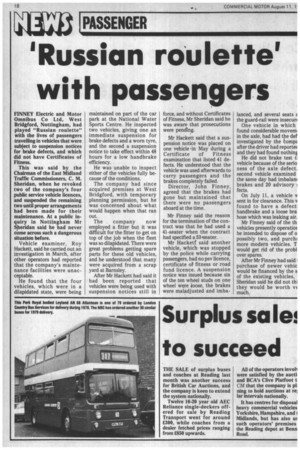'Russian roulette' with passengers
Page 20

If you've noticed an error in this article please click here to report it so we can fix it.
FINNEY Electric and Motor Omnibus Co Ltd, West Bridgford, Nottingham, had played "Russian roulette" with the lives of passengers travelling in vehicles that were subject to suspension notices for brake defects, and which did not have Certificates of Fitness.
This was said by the Chairman of the East Midland Traffic Commissioners, C. M. Sheridan, when he revoked two of the company's four public service vehicle licences, and suspended the remaining two until proper arrangements had been made for their maintenance. At a public inquiry in Nottingham Mr Sheridan said he had never come across such a dangerous situatkin before.
Vehicle examiner, Roy Hackett, said he carried out an investigation in March, after other operators had reported that the company's maintenance facilities were unacceptable.
He found that the four vehicles, which were in a dilapidated state, were being maintained on part of the car park at the National Water Sports Centre. He inspected two vehicles, giving one an immediate suspension for brake defects and a worn tyre, and the second a suspension notice to take effect within 48 hours for a low handbrake efficiency.
He was unable to inspect either of the vehicles fully because of the conditions.
The company had since acquired premises at West Bridgford, with temporary planning permission, but he was concerned about what would happen when that ran out.
The company now employed a fitter but it was difficult for the fitter to get on top of the job when the fleet was so dilapidated. There were great problems getting spare parts for these old vehicles, and he understood that many were acquired from a scrap yard at Barnsley.
After Mr Hackett had said it had been reported that vehicles were being used with suspension notices still in force, and without Certificates of Fitness, Mr Sheridan said he was aware that prosecutions were pending.
Mr Hackett said that a suspension notice was placed on one vehicle ,in May during a Certificate of Fitness examination that listed 41 defects. He understood that the vehicle was used afterwards to carry passengers and the brakes completely failed.
Director, John Finney, agreed that the brakes had gone but maintained that there were no passengers aboard at the time.
Mr Finney said the reason for the termination of the contract was that he had used a 41-seater when the contract had specified a 53-,seater.
Mr Hackett' said another vehicle, which was stopped by the police while carrying passengers, had no psv licence, certificate of fitness or road fund licence. A suspension notice was issued because six of the ten wheel studs on one wheel were loose, the brakes were maladjusted and imba lanced, and several seats z the guard-rail were insecur( One vehicle in which found considerable movem, in the axle, had had tpe clef investigated by the bompz after the driver had reportet and they had found nothing He did not brake test ti vehicle because of the serio ness of the axle defect. second vehicle examined the same day had imbalarn brakes and 20 advisory fects.
On July 11, a vehicle v sent in for clearance. This v found to have a defect handbrake and a loose bra hose which was leaking air.
Mr Finney said of the th vehicles presently operatiot he intended to dispose of o possibly two, and purchi more modern vehicles. T would get rid of the probl over spares.
After Mr Finney had said1 purchase of newer vehic would be financed by the s of the existing vehicles, Sheridan said he did not thl they would be worth IR much:
































































































